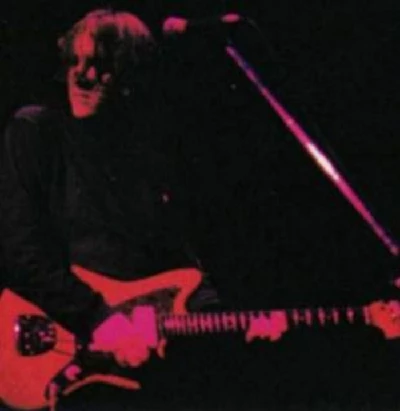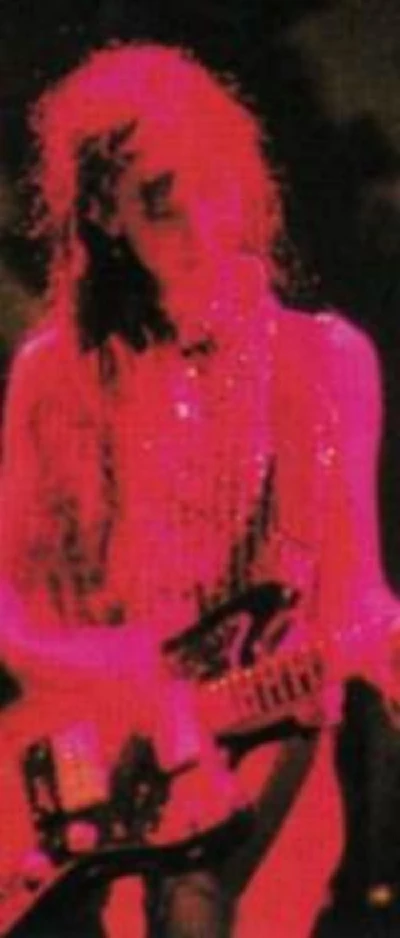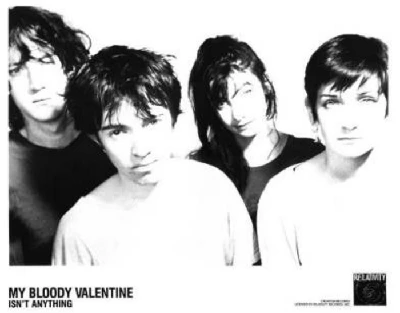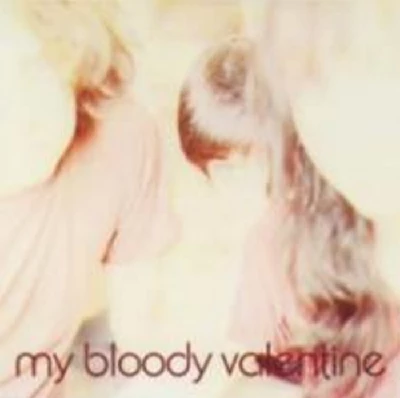published: 25 /
9 /
2002

My Bloody Valentine's 'Loveless' album was one of the classic albums of the early 90's, but took 2 and a half years to record and nearly bankrupted the Creation label. Olga Sladeckova reflects on the stormy history of the shoegazing movement pioneers
Article
The phrase ‘Valentine’ is associated in many parts of the world with St Valentine’s Day, and the word ‘love’. In general that means the love between 2 people, yet that is only the most commercial ,and also the most limited explanation. For other people in the same, and maybe also in other parts of the world, the name is connected with music, and in particular one unique and decidely uncommercial band, whose life story has become an important part of musical history. That band is the American-Irish-English group, My Bloody Valentine.
The My Bloody Valentine story has its beginning in New York where a family with 3 children, Ann, Kevin and Jimi, lived. The family, whose surname was Shields, moved a lttile later, when Kevin was 6, to Dublin in Ireland.
Kevin discovered pop music for the first time there and started dreaming, like other kids of his age, of playing in a band or even better of forming one. And so it happened. It was also there in Ireland that for first time he met another future My Bloody Valentine member, Colm O'Ciosoig. They both answered to the same advert in a paper and formed a band called Complex. At that point their playing was not serious. The band occasionally rehearsed together, using the Virgin Prunes and the Ramones as their main influences, and played hardly any gigs. They also tried out various other monikers such as Hothouse Flower and Life In A Day.
My Bloody Valentine were officially formed in 1984 by Kevin (guitars), Colm (drums) and Dave Conway (vocals), who answered an advert the other two put up in a record shop. Lacking a bass player, they asked David's girlfriend,Tina, for help. Tina didn't have any experience of playing the bass, but quite confidently managed to play the Casio Synthesizer as a replacement. Dave then came up with the name 'My Bloody Valentine' (After a Canadian slasher horror film called 'My Bloody Valentine', which was released in 1981). "It seemed like some good words" was his explanation for it.
It became apparent very early on that Dublin wasn't the place to be for My Bloody Valentine. "We wanted to go anywhere, but London" said Kevin later in an interview in the Rollercoaster tour programme in 1992. "It's such a cliche, you know, going to London. Just think of it, every Irish band that went to London, where are they now?"
At the time David had begun occasionally travelling around Europe with Gavin Friday from the Virgin Prunes on solo gigs. He passed a few demos around people when he was out there, and got the band their very first gig abroad in Holland. The Valentines grabbed the chance to get out of Ireland with both hands and moved to Holland permanently. Living in Holland, however, was not easy and it soon proved impossible out there to make music.
The band was desperate for gigs and kept asking around for about live dates. By chance they came across a person who ran his own record label, Tycoon, and who asked them if they wanted to record a mini album for him.
Excited and a bit naïve, the Valentines couldn't have said 'Yes' any faster. They recorded a few songs, designed a sleeve, and then that was it. None of them were allowed to help to mix or to even hear the album, which was called 'This Is Your Bloody Valentine',until it was pressed. In the end, they didn’t even get paid for it, the one thing that they desperately needed more than anything else.
Tiring of life abroad and stricken with poverty, they decided to move back to UK. They did not want go back to Ireland and be proved wrong for self-believing in their music, so, despite all their reservations, they moved to London in 1985.
At the time the group’s line-up consisted of Kevin Shields, Colm O'Ciosoig and Dave Conway. Tina, who had only originally been drafted in to help out, and who was never really an official member of the band , left the group a short while after they moved back to London. The trio needed a bass guitarist., and, through a friend, they got in touch with Debbie Googe, a bassist, who was also living in London. "I went along to a practise" said Googe in an interview in 1992. "And they never really said you're in the band. They just kept saying 'We're practicing again next week if you want to come.' After a while we went in the studio to do the first EP ('Geek' on Fever records), so I just sort of assumed I was in by that point."
Things were now starting to pick up for My Bloody Valentine. Their fanbase had extended and they were being offered more gigs. Joe Foster (co-founder of Creation records) was starting his own label, Kaleidoscope Sound, and wanted My Bloody Valentine to be on it. The Valentines were pleased with his offer and in 1986 recorded 'The New Record By My Bloody Valentine', a second EP which was clearly influenced by the Jesus & Mary Chain.
‘The New Record By My Bloody Valentine’ sold only in modest numbers. Foster’s Kaleidoscope Sound was not in the position to afford another release by the band, so the group went out on the road again.
The following year, 1987, proved to be a year of changes. David Conway had been suffering for a long time from stomach problems, and couldn't eat properly. Being in a band and travelling around a lot made things much worse, and so he eventually decided to leave the group.
Replacing Conway was clearly impossible. The band even considered changing its name as its remaining members felt that things would never be the same again, but at the last minute they went through a change of heart. My Bloody Valentine got their new singer , Belinda Butcher, a dancer with a degree, through an audition which she won when she sang ‘Bargain Store’ by Dolly Parton. The only thing she had to do then was to learn to play the guitar, which she managed almost professionally.
In 1987, My Bloody Valentine also found themselves a new home at Lazy records (the Primitives’ label). From this collaboration, the ‘Sunny Sunday Smile’ ep ; the ‘Strawberry Wine’ ep ; ‘Ecstacy, a mini album and ‘Ecstacy And Wine’ (which compiled together the two previous releases) were released over the course of 2 years. ‘Strawberry Wine’ was the first recording with Shields on vocals.
The Lazy releases showed the band establishing their character, and moving in a new direction in which, using their guitars to make a powerful noise, they created a unique sound.
The band’s new character proved most appealing to its audience, which included the head of Creation records, Alan McGee.
The first time that Allan McGee saw the band was in 1988 when the Valentines supported his band, Biff Bang Pow! . McGee fell for the Valentines on the spot and after the gig asked them if they wanted to record a few songs for Creation.
"Of course we weren't going to say no, but Kevin was really eager to stress that it wasn't going to be like the stuff that we'd done before” Said Googe in an interview (www.creation-records.com) in 2001. “And Alan was really cool and just said to go ahead and do whatever you like, so we did."
Creation then booked My Bloody Valentine into a studio for 8 months which was how long it took to record an EP 'You Made Me Realize' (August 1988). The group's popularity started rising very quickly. Creation were very pleased with the band, as was the band with them who agreed to record their first full length album album for the label. "This ws the first time we'd never had to worry about recording costs and budgets. We could spend all our energy on the making of the record. We could do anything, use anything, just do it." said Shields later an interview for Spiral Scratch magazine.
The 12 track 'Isn't Anything' came out in November 1988. The press loved the album and so did fans. The album sold around 40 000 copies in Britain over a period of a year. The Sire/Warner Bros major record company then became the band’s US label.
‘Isn’t Anything’ is often assumed to be the first ‘shoegazing’ album, with My Bloody Valentine being branded as the movement’s originators . ‘Isn’t Anything’ brought not only a lot of excitement, but also put a huge pressure on the band not do disappoint with their next release. Shields became as a result more and more obsessed with the perfectionism of his recordings.
The first sign of that appeared in 1989 when Creation booked the band into Blackwing Recording Studios in Southwark in London to record an EP. 5 days later it appeared that no recording had been done. McGee went down the studio and tried to push Shields into making some progress. "We were doing an overnight mixing session with Kevin and Colm” McGee said in an interview in David Cavanagh's book ‘History Of Creation Records’. "We were trying to get Kevin to make decisions on tracks and there was just no way we could. It was like there was an immovable thing in his head that we couldn't get past." In the end the session was abandoned and the EP never came out.
The fatal moment for Creation came in September 1989 when McGee allowed the band back into the studio to record their second full-length album.
The musicians settled into a studio in Wapping with inhouse engineer Nick Robbins. Strangely enough it was only Shields and O'Ciosoig who workied on the album. Googe and Butcher were seen only at the beginning of its recording, either bringing some equipment in or taking it away. Also no one was allowed to witness the recording including McGee , who became more and more flustered by this as the recording went on.
The band, and Shields in particular, took an amazingly slow approach to recording. Robbins was later to tell David Cavanagh.. "Colm and I would come into the studio around midday and Kevin wouldn't even turn up until seven o'clock in the evening because he was supposedly at home writing. He's come in - and he would clearly have not written anything at all - and then he'd disappear off to the pool room again and we wouldn't see him until midnight. Then he'd come out at midnight and go home. And this was day after day after day." Robinson later decide to leave the project as he saw it as a waste of his time and he was replaced by Harold Burgon.
Changing engineers become quite an ordinary matter after a while. The sixth engineer, and not by any means the last one, happened to be Alan Moulder, who had worked with the Jesus and Mary Chain on 'Automatic'. He also would eventually leave , because it was taking so long to work on other projects with Shakespears Sister and with Ride, but not before producing the band’s EP ‘Glider, which includes an Andrew Weatherall ( who would soon become well known especially after working with Primal Scream on ‘Screamadelica’) dance mix of ‘Soon’.
In 1990 My Bloody Valentine set off for a short tour round UK and Ireland. The tour earned the band publicity for their agonisingly loud sound. Noel Thomson mixed the sound for the band's tour, and the loudness that the Valentines requested surprised him.
During shows, Shields even asked McGee to keep an eye on Thomson, so that he wouldn’t reduce the volume when no one was looking. The band seemed to be obsessed with loud music and testing its impact on the audience, believing that, as result, they might reach some unique kind of plateau of sound or reaction. The only reaction that it evoked was to send fans in the better case running away to hide with their hands over their ears, or worse still off to besick.
The band's methods were equally unique in the studio. There were no names for songs that were being worked on, but simply numbers. One story tells of Shields putting up a tent in a studio to record his guitar. His aim was to record a large sound with no ambience. Unfortunately that didn’t work due to the unwanted sound effects that the tent created. Apparently taking away one reflection makes another one more apparent, and so on. Shields would also pick a number and work at it and then pick another one and work on that, often working at several numbers at once.
Shields’ annoyance with McGee, who kept urguing him to finish the album, was reflected in his eventual choice of song titles for the album Shield’s constant reply of “Soon’ seemed the perfect title for the 11th track of the album. Similarly there was the third track, ‘To Here Knows When’. There is definitely no need to explain the title - ‘Loveless’.
At the beginning of 1991 the songs number 8, 10 and 21 seemed the nearest to finishing and so the band concentrated on finishing those for an EP. The songs were the foresaid 'To Here Know When', Swallow' and 'Honey Power'. Adding 'Moon Song', an EP 'Tremolo' was released. Shields then sent a tape to McGee to listen to. McGee insisted there was something wrong with the tape and then in disbelief found out there wasn't. 'Tremolo', however, attracted a respectful enough following, charting at number 29.
It took another 7 months for the band to complete the album. ‘Loveless’ finally came out in November in 1991 , earning excellent international reviews and reaching number 24 in the British album charts ..
McGee;s reaction to the album was, however, one of initial dumbfoundment and horror. As Ed Ball , a Creation all-rounder was later to tell Paolo Hewitt for his book 'The Creation Story', McGee was at the time in the US. “We were playing the song (‘To Here Knows When’) down the phone! And he’s saying, ‘Are the speakers right, Ed? What’s going on? I told him. ‘Well it’s very ambient piece of music and the vocal are lost in the mix. Deliberately so.’ And Alan goes, ‘Oh, my God. I’ve spent a quarter of a million pounds and I can’t hear the vocals.”
‘Loveless’ is seen to be My Bloody Valentine’s great masterpiece. It proves the band’s originality and ability to express themselves in a unique way, using their music instead of words. Vocals were used purely as another instrument drowned in the sound beyond the point of recognition.
All in all it took 2 and a half years, and 18 engineers (including eventually Shields and O'Ciosoig themselves) ) to record an 11 track album and cost an unbelievable £ 270,000. It’s quite a big difference compare to ‘Isn’t Anything’ whch took 2 months to record and cost £ 7,000. Shields later gave an interesting explanation to the length of recording of the labum. "We started out on the wrong foot and never got back on the right one. Right up until the last minute, we kept thinking we would be finished in a couple more months - two years of thinking we would be finished in a couple more months."
Creation was at the edge of bankruptcy and dropped the band. The Valentines found themselves a new home at Island records and under their flag entered a studio again in 1992. Entering the studio was the only thing they did for Island. No more records by My Bloody Valentine have been released.
"He obviously can function on a level” said McGee talking to Hewitt. “He can come, play guitar but I don't think he'll make another My Bloody Valentine record ever again. But in the meantime he's taken £ 500 000, I think, off Island, approximately a quarter of a million off EMI Publishing and apprximately a quarter of a million off Warner Brothers in America. And none of them have ever heard one piece of music. And the best bit is - he thinks - it's their fault. Which I love. I love him. He's my friend. But I wouldn't want to be in business with him again. Only because you become his enemy.”
The band toured with “Loveless’ in 1991 and 1992. The group also joined the Mary Chain on their ‘Rollercoaster’ tour in 1993 next to Dinosaur Jr. and Blur.
In the mid 90’s the band started slowly to fade from the music scene. They recorded a James Bond cover for a charity compilation in 1993 and gradually split up. In 1996 Debbie Googe formed Snowpony and has now recorded 2 albums with them (‘Slow Motion World of Snowpony’ and ‘Sea Shanties for Spaceships’)
McGee, in spite of insisting of never doingbusiness with Shields ever again, gave him another chance. On the Poptones label , which McGee set up in 2000 after Creation ended, he signed Shields self-consciously to make a one off single, ‘Harmony’, with a one off project Le Volume Courbe which came out in 2001.
In 1999 Shields joined Primal Scream on a guitar and worked on their 7th album ‘Exterminator’. He has now become a permanent member of the group. He also collaborated on their 8th album ‘Evil Heat’ and tours with the band.
Over the course of 11 years, since 'Loveless' came out, it became clear that My Bloody Valentine are one of the corner stone bands of the independent music scene. Tt might not have been noticeable at the time, but one thing is clear now. Their music will never be loveless.
Picture Gallery:-




